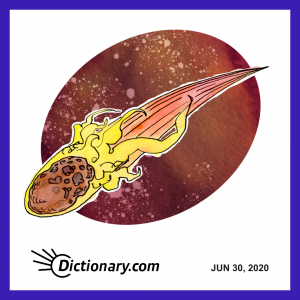Word of the Day
bolide
noun
Astronomy.
a large, brilliant meteor, especially one that explodes; fireball.
More about bolide
A bolide is a large, brilliant meteor that explodes before hitting the earth. The term comes from French, from Latin bolis (inflectional stem bolid-) “meteor,” from Greek bolís (stem bolíd-) “missile, javelin, flash of lightning, throw of a pair of dice.” The Latin sense “meteor” is first recorded by the Roman naturalist and encyclopedist Pliny the Elder in the first century a.d., perhaps from a resemblance between a fireball in the sky and a flash of lightning. Bolide entered English in the mid-19th century.

how is bolide used?
At exactly fourteen minutes after eight … the bolide passed overhead. It was an amazing spectacle. It left a trail of flame behind, across thirty degrees of sky.
A meteor that explodes in mid-air before it hits the ground is known as a bolide. It’s thought that the high-pressure air in front of the falling meteor seeps into cracks in the rock, increasing internal pressure and causing the rock to break apart.
bolide


anchorite
noun
a person who has retired to a solitary place for a life of religious seclusion; hermit.
More about anchorite
The English noun anchorite “hermit” comes from Middle English anchorite, anachorite, ancorite, from Old French anacorittes and Medieval Latin anachōrīta, equivalent to Late Latin anachōrēta “a hermit, eremite, recluse, ascetic,” from Late Greek anachōrētḗs “one who has retired from the world,” a derivative of anachōreîn “to withdraw, retire.” Anachōreîn is a compound of the adverb and preposition aná and prefix ana– “up, back, re-“ and chōreîn “to make room for, withdraw, give way,” a verb derived from chôros “piece of ground, space, place.” Anchorite entered English in the 15th century.
how is anchorite used?
I am most gratified to find that you are among those who indulge in a legitimate enjoyment of the good things of life. I am sure that if God intended us to be anchorites he would have fashioned this world after another sort.
We’re all lonely now. We’re all cut off from each other, trapped inside the walls of our own domestic space, the 21st-century version of the medieval anchorite.
anchorite


megafauna
noun
Zoology.
large or giant animals, especially of a given area.
More about megafauna
Megafauna is a hybrid of mega-, a combining form meaning “very large” (as in megachurch and megalith), from Greek mégas “large,” and fauna “the animals of a given region or period considered as a whole.” Fauna comes from the Latin proper noun Fauna, a rustic goddess and sister of Faunus, the rustic god who protected fields, herds, agriculture, and shepherds, identified with the Greek god Pan. Megafauna tend to have long lives and slow population growth and recovery rates. As a result, many such species, as elephants and whales, are particularly vulnerable to overexploitation by humans. Megafauna entered English in the first half of the 20th century.
how is megafauna used?
Poaching threatens megafauna, our planet’s largest animals that often function as the keystones of their respective ecosystems.
Like the V-shaped graptolites or the ammonites or the dinosaurs, the megafauna weren’t doing anything wrong; it’s just that when humans appeared, the “rules of the survival game” changed.
megafauna





